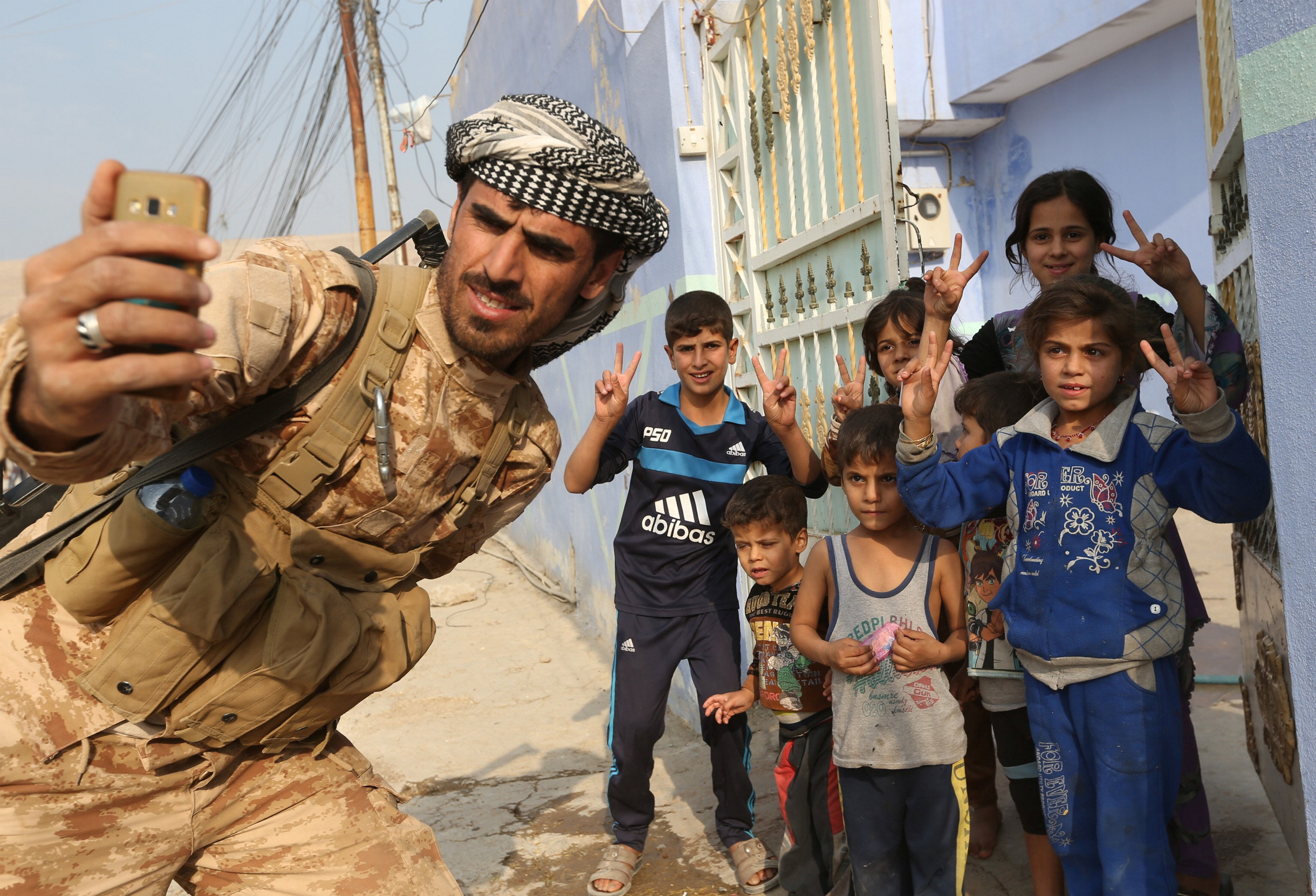Image: A Kurdish Peshmerga fighter takes a selfie with children after recapturing the Fadiliya village from Islamic state militants, in Nawaran North of Mosul, Iraq, October 27, 2016.
By Michael Georgy
FADILIYA, Iraq (Reuters) – When Kurdish fighters cleared Islamic State from the northern Iraqi village of Fadiliya, some residents celebrated by passing around cigarettes – an act that would have earned them a public whipping under the group’s reign of terror.
Peshmerga forces took the village on Thursday as they advanced towards Mosul, Islamic State’s last main stronghold in Iraq which lies about four km (2.5 miles) away.
As the fighters moved through the streets and greeted villagers, there was no longer any sign of the jihadists, alive or dead. Their fear easing, local people began speaking openly for the first time about their two years under Islamic State occupation.
“If you are caught smoking you get whipped with a water hose 50 times in public,” said Othman Mahmoud, as his friend handed around a pack of cigarettes with a smile.
A teenager joined the gathering, describing a code imposed with ferocity on every aspect of personal life, right down to facial hair.
“If you are caught growing sideburns you get whipped 25 times,” he said. “There were so many things we could not do.”
Young men in their 20s all had beards of similar length to meet the demands of the group which captured Fadiliya during a lightning sweep of northern Iraq in 2014.
One of them had complied with the beard rules, but was still punished after getting into a harmless argument with a friend while playing soccer. He was publicly whipped on the dirt pitch.
The short distance away in Mosul, Islamic State leader Abu Bakr al-Baghdadi walked into a mosque two years ago to declare a caliphate and himself as the leader of the world’s Muslims.
Now Iraqi and Kurdish forces are recapturing territory as part of the offensive to recapture Mosul from Islamic State, which is known by its opponents in Arabic as Daesh. The battle for Iraq’s second city is expected to be the biggest since a U.S.-led invasion of the country in 2003.
Several residents and a peshmerga commander said it took only about 50 militants to control Fadiliya, whose population once numbered 5,000 before many villagers fled, so pervasive was fear of the group.
HIDDEN CELLPHONE
After 10 days of pressing the jihadists, Kurdish forces took full control after firing mortar rounds at their positions on Thursday. Residents had hung up white flags on their homes, hoping to avoid being targeted by airstrikes.
Children joyfully ran through the streets singing songs and chanting “peshmerga”, “peshmerga”, “peshmerga”.
One peshmerga fighter named Ahmed arrived at his home to see his loved ones for the first time in two years.
His sister stood in the doorway and wept and screamed while looking up to the sky. “Daesh ruined our lives. Look what they have done to us,” she said.
Ahmed’s brother-in-law described how the family had taken risks to make contact with him every 25 days. Possession of a cellphone was punishable by torture, or worse, he said.
“We kept the cellphone hidden and only used it to call him. But we hid in a room and whispered,” said the brother-in-law, Wasim Abdullah. “Islamic State had a habit of climbing over people’s walls at night for surprise inspections of homes.”
The jihadists appeared to have melted away. “Some of them escaped through tunnels,” said a peshmerga commander.
But there were plenty of reminders of what they had done – cars that had been blown up, demolished buildings, bullet holes. “They kill. They kill,” said a 12-year-old girl named Nour.
Villagers said they had not seen any public executions or beheadings – Islamic State’s favourite method of spreading fear.
They noted, however, that people were often taken to Mosul for the maximum punishment, and word always got back to Fadiliya so that threatening notes that Islamic State distributed would keep everyone on edge.
As more and more people came out of their homes to taste freedom that had been unthinkable for so long, Khalid Abdel Hafiz tried to hold back tears as he recalled a knock on his door one week ago. The militants took away his 19-year-old son Ihsan along with 14 other young men.
“They just showed up and said ‘we have security orders from high up’,” he said. “I have no information about Ihsan. I am resigned to the fact I will never see him again.”
(editing by David Stamp)
Copyright 2016 Thomson Reuters. Click for Restrictions.


